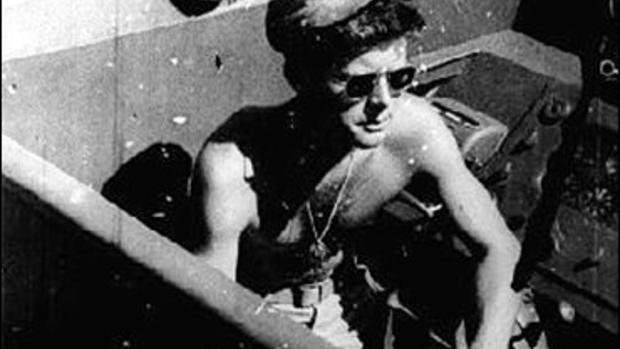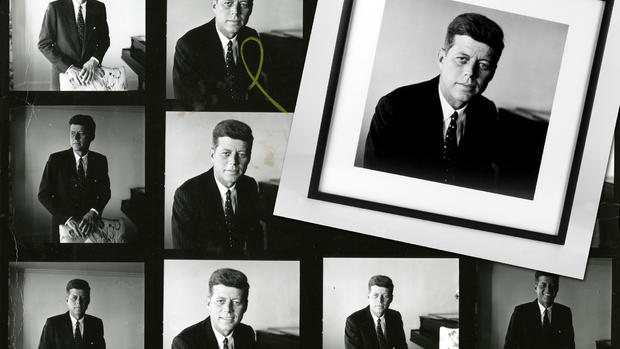JFK: His ambition and legacy
(CBS News) Ask anyone above a certain age and they can tell you exactly where they were when they heard the news of John F. Kennedy's death. It was an incomprehensible end to a presidency that had begun on such a thrilling and inspiring note. Our Cover Story is reported by Rita Braver:
"Let every nation know, whether it wishes us well or ill, that we shall pay any price, bear any burden, meet any hardship, support any friend, oppose any foe, in order to assure the survival and success of liberty."
He was the youngest-elected president in history, coming into office at the height of the Cold War -- a man endowed with grace, good looks, and a wide-ranging intellect.
"He had a gift for touching the best, humane, most idealistic impulses in America," said historian Robert Caro. "He had a gift for rallying the country."
And 50 years after his death, Americans are still fascinated by him.
So we asked Caro and two other noted historians to help us explore John Fitzgerald Kennedy's life and his presidency.
Robert Dallek believes at least that part of the attraction is that Kennedy died so young.
"He's frozen in our minds at the age of 46," he said. "People can't imagine that if he were alive today, he'd be 96 years old. So there he is, so youthful, so handsome, so charming, so witty."
Thurston Clarke said Kennedy was also a very complicated human being: "John F. Kennedy is a marvelous human puzzle. You think you have gotten to the end of it, you think you've solved it, and then something else happens."
He was born in 1917, the second of nine children, into a legendary Irish-American family. His father, Joseph, was a multimillionaire who served as ambassador to Great Britain.
In 1941, after graduating from Harvard, John Kennedy enlisted in the Navy.
As World War II raged on, he took command of PT 109, a small torpedo boat that was ultimately cut in half by a Japanese destroyer in the South Pacific.
Kennedy is hailed as a hero. But it was only after his older brother Joe, a Naval aviator, was killed in action, that John Kennedy decided on a political career, serving in the House and then Senate.
"It wasn't his father entirely tapping him on the shoulder [saying], 'Boy, you're next,'" said Clarke. "This is a very ambitious man. I think if you rated presidents on ambition, I think Kennedy would be at the top of the list."
And that ambition led Kennedy to run for the White House in 1960, despite what was considered a lackluster Congressional career.
Braver asked, "What gives this man the kind of chutzpah to say, 'I'm going to be president'?"
"For one thing, there's a genius about him," replied Caro. "He can see trends. He can generalize from what he's watching. And he knows that he's great on television. He knows there's a new force coming in politics in America, and it's television."
Kennedy rolled over Lyndon Johnson and other, more seasoned Senators to become the Democratic nominee.
He then outshone Vice President Richard Nixon, the Republican candidate, in the first-ever televised presidential debates.
And despite his youth, inexperience, and Catholic background, John F. Kennedy won the White House, and delivered an Inaugural Address that still resounds:
"Ask not what your country can do for you; ask what you can do for your country."And he had big ideas, founding the Peace Corps, and soaring to new heights in space.
A year and a half later, in October 1962, there was a worldwide crisis after surveillance photos detected that the Soviet Union had placed nuclear missiles in Cuba.
Kennedy ordered a Naval blockade and made it clear, if the Russians didn't yield, the world could be headed for nuclear war.
"The cost of freedom is always high. But Americans have always paid it. And one path we shall never choose, and that is the path of surrender and submission."
Soviet leader Nikita Khrushchev backed down.
"If you talk about Kennedy's legacy, if he had no other legacy, in the Cuban missile crisis he really did save the world from what was a real threat of a nuclear war," said Caro. "If it doesn't happened, you think it couldn't happen. That wasn't the case."
But Kennedy was facing his own personal struggles.
He went to great lengths to hide his case of Addison's, a disease of the adrenal glands. And he had to brave intense back pain, wearing a brace hidden under his clothes."He not only put on the brace, but he would take an Ace bandage and wrap it in a figure-eight around his leg and then around his back to give him greater support," said Caro.
And though he and Jacqueline Kennedy and their two children were the perfect picture of family bliss, history has shown that John Kennedy was a womanizer.
"He had call girls; he had serious, glamorous women," said Dallek. "He had some of the aides at the White House. But you see, I think there was a quality of excitement for him in this, that he was a prince of the realm, and he wasn't going to get caught."
Indeed, reporters of the time seemed blinded by Kennedy's charm and humor, especially at his frequent press conferences:
Reporter: "I wonder if you could tell us whether, if you had it to do over again, you would work for the presidency and whether you can recommend the job to others."
President Kennedy: "Well, the answer to the first is 'yes,' and the second is 'no.' I don't recommend it to others -- at least for a while."
But in November of 1963, he was focused on a host of serious foreign and domestic issues, from trying to get a major civil rights bill passed, to grappling with events in Vietnam, to what became his top priority: insuring an era of peace.
"He saw his path to greatness as being the man who had ended the Cold War," said Clarke.
And to do that, he wanted a second term in office. So he and Jackie decided to make a campaign trip to Dallas.
And then as their motorcade made its way through the city, those shots rang out . . . leaving a stunned nation and an unfinished legacy.
Braver asked Caro, "What was it that moved this nation so much?"
"It's youth, grace, beauty, hope, promise . . . the crack of a gunshot, murder, horror, blood, assassination. As history goes on, it will stay a very prominent part of history. It's never gonna fade. It's never gonna fade."
Complete CBSNews.com coverage: JFK Assassination - Includes galleries, articles, and streaming video of CBS News' original broadcasts from four days in November 1963.
For more info:
- robertcaro.com
- "Camelot's Court: Inside the Kennedy White House" by Robert Dallek (HarperCollins); Also available in eBook and Large Print formats
- thurstonclarke.com
- "Rose Kennedy's Family Album: From the Fitzgerald Kennedy Private Collection, 1878-1946" by Caroline Kennedy (Grand Central Publishing); Also available in eBook format
- Thanks to The Carlyle Hotel, New York City

